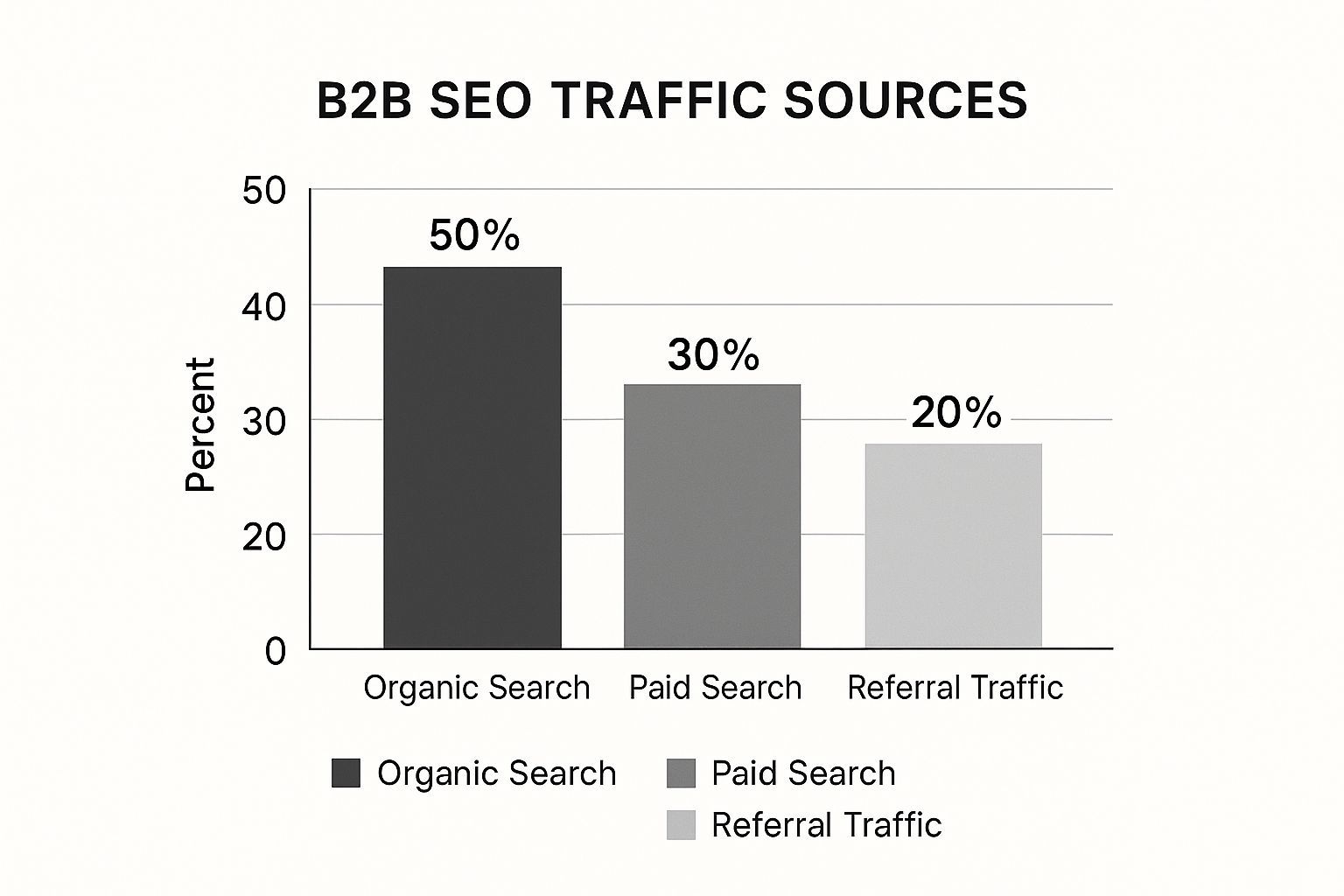
Digital Marketing for B2B: UK Strategies That Drive Growth
The Power of Digital: Reshaping B2B Marketing in the UK
The UK's B2B landscape is changing. The traditional, relationship-focused, face-to-face interactions that once defined B2B marketing are steadily being replaced by the ever-growing influence of digital channels. This isn't just a passing fad; it's a fundamental shift in how businesses connect, communicate, and conduct business. This means B2B marketers must adapt to succeed.
Why Traditional Methods Are Fading
The decline of traditional methods isn't simply a change in style. It's a direct result of evolving buyer behavior. Decision-making committees aren't solely relying on sales presentations and printed materials anymore. They're researching online, consuming content differently, and conducting independent research before ever speaking with a sales representative. Industry reports, online reviews, and social media conversations now play a much bigger role.
The Digital Advantage: Reach and Measurement
Digital channels offer what traditional methods can't: remarkable reach and measurability. Marketers can precisely target ideal customers, track campaign performance in real time, and demonstrate a clear return on investment. Digital platforms provide a wealth of data and analytics, offering insights into customer behavior and preferences. This data-driven approach helps marketers refine strategies and optimize campaigns for maximum impact, letting UK businesses connect with wider audiences, regardless of location.
The Impact of Digital on B2B Revenue
This shift to digital has been substantial. The UK's B2B sector has seen a significant rise in revenue from digital channels. According to Statista, this share grew from 33% in 2021 to 46% by 2024. This highlights the growing importance of digital marketing in the B2B landscape as businesses increasingly rely on digital platforms to connect with clients.
Adapting to the Change: Successes and Challenges
The digital revolution has created a divide between those who embrace change and those who stick to outdated methods. UK companies successfully integrating digital strategies see positive results: increased lead generation, improved brand visibility, and stronger customer engagement. Those resisting the shift find traditional methods increasingly ineffective and lose market share to digitally adept competitors. Understanding this dynamic is crucial for UK B2B marketers to navigate this changing landscape and align strategies with modern buyer demands.
Crafting a B2B Digital Strategy That Actually Works

The digital world has significantly changed how B2B buying happens. For UK B2B businesses, a winning digital marketing strategy isn't just a good idea anymore—it's essential. This section offers a practical plan for building strategies that tackle the challenges and seize the opportunities this shift creates.
Aligning Your Efforts With the B2B Sales Cycle
B2B sales cycles are generally longer and more intricate than B2C. They often involve several decision-makers and a more thoughtful buying process. Your digital marketing strategy needs to guide leads through each step, from initial awareness to final purchase. This means understanding your audience's specific needs and pain points at every interaction.
For example, in the awareness stage, concentrate on informative content that addresses industry issues. As prospects move to the consideration stage, offer detailed case studies and product comparisons. Finally, in the decision stage, provide personalized demos and consultations. This ensures your marketing remains relevant and effective throughout the buyer's journey.
Segmenting Your Audience for Targeted Campaigns
Effective B2B digital marketing hinges on audience segmentation. Divide your target market into smaller groups based on shared traits like company size, industry, job title, or buying behavior. This lets you design highly targeted campaigns that connect with each segment's particular needs and interests.
Think of it like a tailor crafting a suit. They don't take a one-size-fits-all approach. They meticulously measure and adjust the garment for a perfect fit. Similarly, segmented marketing campaigns deliver the right message to the right audience at the right time, boosting engagement and conversions.
Defining Measurable Objectives and Tracking ROI
Setting clear, measurable objectives is vital for any successful B2B digital strategy. These objectives should connect directly to your business goals, like generating qualified leads, increasing sales, or raising brand awareness. For more insights into best practices for B2B ecommerce, check out this guide on B2B Ecommerce Best Practices.
Tracking your return on investment (ROI) is also crucial. It shows the value of your digital marketing work. By monitoring key metrics like website traffic, lead generation, and conversion rates, you can pinpoint what's effective and what needs adjusting. This data-driven method allows you to refine your strategy and maximize campaign impact.
Building an Integrated Strategy for Long-Term Growth
A successful B2B digital marketing strategy needs a comprehensive approach. Integrate various channels and tactics, such as SEO, content marketing, social media, and email marketing, to create a cohesive and powerful experience.
This integration is like an orchestra. Each instrument plays a unique part, but together they create beautiful music. Integrating your digital marketing channels amplifies your message, reinforces brand consistency, and drives sustainable growth. Staying adaptable and responsive to market changes is also vital for long-term success. A well-defined strategy provides a solid base but also needs flexibility to adapt to new trends and technologies.
Framework for Your B2B Digital Strategy
The following table provides a starting point for understanding the core elements of a B2B digital marketing strategy:
B2B Digital Marketing Strategy Framework
A structured approach to building your B2B digital marketing strategy with key components and considerations at each stage
| Strategy Component | Key Considerations | Implementation Tips |
|---|---|---|
| Target Audience Definition | Company size, industry, job title, pain points | Conduct thorough market research and create buyer personas. |
| Sales Cycle Alignment | Mapping content to each stage of the buyer's journey | Develop targeted content for awareness, consideration, and decision stages. |
| Channel Integration | Choosing the right mix of channels (SEO, content, social media, email) | Create a cohesive strategy that leverages each channel’s strengths. |
| Measurement & Analysis | Defining KPIs and tracking ROI | Use analytics tools like Google Analytics to monitor performance and refine your strategy. |
This framework offers a structured way to build your digital marketing strategy for the UK market, ensuring it aligns with your business goals and produces measurable results.
High-Impact Digital Channels for B2B Growth
Not all digital channels offer the same potential for B2B marketing. This exploration focuses on platforms delivering real results for UK B2B companies, highlighting what's currently effective in the market.
Understanding the UK B2B Digital Landscape
The UK B2B buying process has changed. Decision-makers rely on digital channels for information and purchases. This underscores the importance of strategic digital marketing aligned with these evolving behaviors.
Key Digital Channels for B2B Success
Certain digital channels are especially effective for B2B growth in the UK:
- Search Engine Optimization (SEO): Foundational to any B2B digital strategy, SEO enhances your search engine visibility, drawing organic traffic from potential clients actively seeking solutions.
- Content Marketing: Creating informative, valuable content like blog posts, white papers, and case studies positions your business as a thought leader and nurtures leads.
- Social Media Marketing: Platforms like LinkedIn build brand awareness, facilitate networking, and engage your UK target audience.
- Email Marketing: Email remains powerful for direct communication, lead nurturing, and driving conversions.
- Paid Advertising (PPC): Targeted paid campaigns on search engines and social media quickly expand reach and drive website traffic.

The infographic above reveals that 50% of SEO traffic originates from organic search, followed by 30% from paid search and 20% from referrals. This emphasizes the importance of investing in both organic SEO and paid campaigns.
For UK B2B businesses, choosing the right digital marketing channels is critical. Email marketing excels, boasting a 2.4% conversion rate for B2B brands. Digital purchasing is on the rise in the UK B2B sector, with 73% of buyers preferring digital over traditional methods. CRM systems dramatically boost sales performance; businesses using them are nearly nine times more likely to exceed sales goals. This data highlights the power of digital marketing tools and strategies for B2B sales and revenue growth in the UK. More detailed statistics can be found here.
Combining Channels for Maximum Impact
Effective UK B2B digital marketing strategies integrate multiple channels. An SEO-optimized blog post, for instance, can be promoted through social media and email, maximizing traffic and lead generation. For impactful B2B growth through digital channels, consider proven lead generation best practices.
Choosing the Right Channels for Your Business
The optimal channel mix depends on your business model, industry, and target audience. Understanding your target customer's online behavior is essential. Consider:
- Where do your ideal clients spend their time online?
- What content resonates with them?
- What are their pain points, and how can your business address them digitally?
To guide your channel selection, the following table offers a comparison:
B2B Digital Marketing Channel Comparison: Comparative analysis of different digital marketing channels for B2B companies, including typical metrics and best applications
| Channel | Average ROI | Best For | Implementation Complexity | Resource Requirements |
|---|---|---|---|---|
| SEO | Varies, but high over time | Building long-term organic visibility & credibility | High | Ongoing content creation, technical expertise |
| Content Marketing | High, especially for lead nurturing | Establishing thought leadership, educating prospects | Medium | Content creation, distribution strategy |
| Social Media Marketing | Difficult to measure directly, but valuable for brand building | Engaging target audiences, building relationships | Low to Medium | Content creation, community management |
| Email Marketing | High, particularly for nurturing and conversions | Direct communication, targeted promotions | Low to Medium | Email list building, automation tools |
| Paid Advertising (PPC) | Varies depending on targeting and industry | Quickly reaching a wider audience, driving immediate traffic | Medium to High | Budget management, ad platform expertise |
This table summarizes the key strengths and resource needs of each channel, allowing you to choose the most effective mix for your business.
Measuring Success and Adapting Your Strategy
Continuous performance measurement is essential. Track key metrics like website traffic, lead generation, conversion rates, and ROI. This data informs campaign optimization and strategic adjustments for achieving optimal results in the dynamic UK B2B market. By focusing on the right channels and continually refining your approach, you can achieve substantial growth and build a strong online presence.
SEO That Delivers Quality B2B Leads, Not Just Traffic

Many businesses understand the importance of SEO, but not all realize its potential for generating B2B leads. It's not enough to simply drive traffic to your website. The real power lies in attracting the right traffic – decision-makers actively seeking solutions like yours. This requires a strategic approach that goes beyond basic keyword optimization.
Keyword Strategies That Target Decision-Makers
Generic keywords might bring in a high volume of traffic, but it's often unqualified. Instead, concentrate on long-tail keywords that reflect the specific needs and challenges of UK B2B decision-makers.
For example, instead of targeting "marketing software," try "CRM software for financial services companies in London." This more focused approach attracts highly targeted traffic that is much more likely to convert into qualified leads.
Understanding the search intent behind keywords is also crucial. Are they researching information, comparing solutions, or ready to make a purchase? Tailor your content to precisely match their intent, guiding them smoothly through the buying process.
Technical SEO For Complex B2B Offerings
B2B websites often present complex product offerings and intricate site architectures. This requires a strong technical SEO framework. Ensure your site is easily crawlable and indexable by search engines like Google, with optimized page speed and mobile responsiveness.
A well-structured sitemap and clear internal linking structure are vital for both users and search engines to navigate complex product information effectively. Furthermore, schema markup can boost your search visibility by providing context to search engines about your content. This increases your chances of appearing in rich snippets and knowledge graphs. This can be especially valuable for B2B companies with complex product specifications or service offerings.
Content Architecture For Lengthy Consideration Cycles
B2B buying decisions often involve extended consideration cycles. Your content architecture should support this process by providing valuable information at every stage.
Create a diverse mix of content formats, from blog posts and white papers to case studies and webinars. Each piece should address different needs and pain points throughout the buyer journey. This strategic approach nurtures leads and builds credibility over time. By consistently delivering high-quality content, you position your business as a trusted resource, increasing the likelihood of conversion. In the UK, SEO is vital for digital marketing. In fact, 60% of UK businesses have an SEO strategy, underscoring its importance for online visibility. Find more detailed statistics here.
Measuring SEO Success Beyond Vanity Metrics
Measuring SEO success requires looking beyond simple traffic numbers. Focus on the metrics that truly matter to your business: conversions, qualified leads, and revenue contribution. Carefully track how organic traffic translates into tangible business outcomes.
By aligning your SEO strategy with your business goals and focusing on quality leads, you can maximize the return on your SEO investment and drive sustainable growth for your UK B2B business. This means shifting from vanity metrics like impressions and clicks to more meaningful indicators, such as lead quality, conversion rates, and ultimately, the revenue generated through organic search.
Content That Converts B2B Decision-Makers

What distinguishes B2B content that truly resonates with decision-makers and drives conversions from content that simply attracts clicks? This section explores the essential elements that empower content to be genuinely influential in the intricate B2B buying process, particularly within the UK market.
Thought Leadership and Credibility
Establishing thought leadership is paramount for building credibility. This involves crafting content that provides genuine value and actionable insights to your target audience. Think of your content as a valuable resource, a guiding light, not just a sales pitch.
Insightful white papers, in-depth blog posts, and engaging webinars can position your business as a trusted authority in your field. This fosters trust and influences decision-makers seeking reliable information.
Addressing Multiple Stakeholders
B2B purchasing decisions often involve a diverse group of stakeholders, each with unique priorities and concerns. Your content should resonate with the various roles within the target organization.
Highlight cost savings for finance directors. Showcase efficiency improvements for operations managers. Focus on strategic alignment for CEOs. By catering to these diverse perspectives, your content becomes more compelling and increases the likelihood of buy-in from the entire buying committee.
Supporting Lengthy Sales Processes
B2B sales cycles can be extensive and complex. Your content strategy should support this by providing relevant information at each stage of the buyer journey, from initial awareness to the final decision.
Consider developing a series of blog posts that educate prospects about a specific challenge. Follow up with compelling case studies demonstrating the effectiveness of your solutions. Offer personalized demos and consultations as they move closer to a purchase. This structured approach nurtures prospects and builds confidence in your expertise throughout their decision-making process.
Balancing Educational Value With Commercial Intent
A central challenge in B2B content marketing is striking the right balance between providing valuable educational content and promoting your offerings. Your content should be informative and helpful, while subtly guiding prospects towards your solutions.
Think of a trusted advisor who provides insightful guidance and then proposes tailored solutions. Similarly, your content should educate while gently showcasing the value of your products or services.
Repurposing Content Across Channels
Maximize your content's reach and impact by repurposing it across various channels. A webinar, for example, can be transformed into a series of blog posts, concise social media updates, or even a visually engaging infographic.
This not only saves time and resources but also ensures consistent messaging across all platforms. By repurposing content effectively, you reinforce your key messages and connect with a broader audience.
Measuring Content Effectiveness
Measuring the success of your content involves tracking the right metrics. While website traffic and social media engagement are important indicators, the ultimate objective is conversion.
Track key metrics such as lead generation, sales conversions, and customer lifetime value to assess the true impact of your content strategy. This data-driven approach allows you to refine your strategy and ensure it directly contributes to your business goals, especially in the competitive UK market. With 64% of consumers making purchasing decisions based on brand values, aligning your content with these values is essential for B2B marketing success in the UK.
Leveraging Data to Outperform Your B2B Competitors
The most successful B2B marketers aren't just gathering data; they're using it strategically. They're turning it into a powerful tool to gain a competitive edge. This isn't about simply tracking website visits. It's about data intelligence: extracting actionable insights that drive real business outcomes.
Building a Robust Measurement Framework
Knowing which marketing activities truly drive conversions is critical. Attributing value across multiple touchpoints can be complex, but it's essential for success. A robust measurement framework connects your marketing efforts to revenue. This involves tracking key performance indicators (KPIs) throughout the entire buyer journey, from the first website visit to the final sale.
Imagine a prospect finds your business through an organic search, downloads a white paper, attends a webinar, and then requests a demo. A strong measurement framework allows you to understand the contribution of each touchpoint. This knowledge empowers you to optimize spending and allocate resources effectively.
The Power of Predictive Modeling
Predictive modeling uses data to anticipate future outcomes. Just as meteorologists use data to predict weather patterns, B2B marketers can analyze past customer behavior and market trends to identify high-potential prospects.
This allows you to target your marketing efforts with precision, focusing resources on the leads most likely to convert into paying customers. It's about making smart, informed decisions based on data, not just intuition.
Personalization That Drives Conversions
True personalization goes beyond simply using a prospect's name. It's about crafting tailored experiences that resonate with individual needs and preferences. Imagine receiving marketing materials perfectly aligned with your current business challenges. It's like a bespoke suit tailored for your unique needs.
Personalization can take many forms, from targeted email campaigns offering specific solutions to website content customized based on browsing history. These tailored experiences increase engagement and conversion rates.
Balancing Automation With Human Insight
Marketing automation tools like Marketo streamline processes and improve efficiency. They handle repetitive tasks, freeing up marketers to focus on strategic decision-making and creative problem-solving.
But human insight is still essential. It's the human touch that crafts compelling narratives, builds authentic relationships, and understands the nuances of the market.
Data-Driven Decisions and GDPR Compliance
Extracting actionable insights from large datasets requires the right tools and expertise. Business intelligence platforms like Tableau and data visualization tools can help you uncover hidden trends and patterns within complex data.
However, it's vital to balance data utility with GDPR compliance. Protecting customer data is not just a legal requirement; it's fundamental for building trust and maintaining a positive brand reputation. This requires robust data security measures and transparent data handling practices.
By strategically leveraging data, maintaining GDPR compliance, and striking the right balance between automation and human expertise, B2B marketers can gain a significant competitive advantage. This data-driven approach is the key to driving growth and achieving measurable results. It's not just a trend; it's the future of B2B marketing.
The Future of B2B Digital Marketing: Beyond the Basics
The B2B marketing world is constantly evolving. What works today might be obsolete tomorrow. This section explores emerging technologies and strategies poised to reshape the UK B2B landscape, looking beyond current digital marketing trends.
Artificial Intelligence: Transforming Campaign Optimization
Artificial Intelligence (AI) is no longer a futuristic fantasy. It's a practical tool transforming B2B marketing. AI-powered platforms like HubSpot analyze massive datasets, identifying patterns and predicting customer behavior. This empowers marketers to optimize campaigns in real-time, personalize content at scale, and automate tedious tasks. Imagine predicting which leads are most likely to convert, allowing sales teams to focus their energy where it matters most.
Voice Search: Changing SEO Strategies
With the rise of voice assistants like Siri and Alexa, voice search is transforming how people find information. B2B marketers need to adapt their SEO strategies accordingly. Instead of focusing on short-tail keywords, prioritize long-tail, conversational keywords that mirror natural speech.
Optimizing for local search is also increasingly vital, as voice searches often have local intent. Think about someone searching, "Find B2B marketing agencies near me." Optimizing for such queries can help UK businesses attract local leads.
Emerging Platforms: Finding the Next Big Opportunity
Beyond established platforms like LinkedIn and Twitter, new platforms constantly emerge. Identifying those with genuine B2B marketing potential is key. Platforms focused on niche communities or specific industries might offer unique chances to connect with highly targeted audiences. Experimenting with these emerging platforms keeps B2B marketers ahead of the curve, discovering untapped markets.
Building Adaptable Marketing Frameworks
The digital world is in constant motion. B2B marketing strategies must be adaptable. Building agile marketing frameworks that can evolve with the market is crucial for long-term success. This means constantly monitoring campaign performance, testing new approaches, and being willing to adjust strategies when needed.
Balancing Innovation and Practicality
While exploring emerging technologies and new platforms is essential, balancing innovation with practicality is equally important. Not every new trend suits every business. Focus on innovations that align with your business goals and target audience.
Don't chase every fleeting trend. Prioritize technologies that offer real value and solve actual business challenges. UK B2B marketers should carefully assess the potential ROI of each new approach, focusing on strategies that deliver measurable results.
Ready to elevate your B2B digital marketing strategy in the UK? Blackbird Digital, a leading UK marketing agency specializing in digital PR and SEO, can help you navigate the digital world and achieve sustainable growth. We combine data-driven strategies with creative storytelling to deliver measurable results. Contact us today to learn more.




